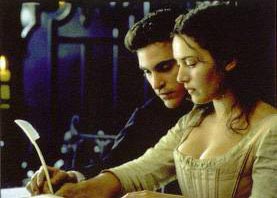Quills (2000)

Director: Philip Kaufman
Screenplay: Doug Wright, from his play
So this is how it was. Last night, I watched Crash, not the new Crash that is supposed to be about prejudice but the one that gives the impression that it is a study in fetishism and the death instinct but is instead a film only a Canadian (David Cronenberg) could make—mildly bemused and basically a cocktease.
This was a frustrating experience, particularly since the movie was not made without skill or unappealing actors (well, Rosanna Arquette and James Spader are appealing, at least). So, today I thought I’d try again with a story about the master of the sexually perverse, the Marquis de Sade.
The Quills cast was even better than the one from Crash—Kate Winslet, Geoffrey Rush, Michael Caine, Joaquin Phoenix, all stars I adore. The director made one of my all-time favorite films, The Unbearable Lightness of Being, a symphony of eroticism. Perhaps best of all, the screenwriter was the same fellow who made me an unforgettable night of theatre by writing his riveting tour-de-force monologue I Am My Own Wife.
Unfortunately, I forgot about another Marquis-inspired evening that was one of the deadliest crashing (sorry, I couldn’t resist) bores of my entire life, the play Madame de Sade by one of my favorite writers, Yukio Mishima. Great writer does not equal great evening. The skillfully crafted, brilliantly acted and directed Quills hits a telephone pole in its screenplay.
The action takes place in the insane asylum at Charleton, where the Marquis (Geoffrey Rush) spent the entire latter half of his life until his death. He has befriended a young chambermaid named Madeleine (Kate Winslet),
 who smuggles his novel Justine out to his publisher. The liberal-minded priest, Abbe du Coulmier (Joaquin Phoenix), uses vocational training to help the mentally ill, allowing them to express their antisocial urges through creative outlets such as writing, acting, and painting. His methods are opposed by Dr. Royer-Collard (Michael Caine), a psychiatric physician sent by the morally offended Emperor Napolean to deal with the writer the old-fashioned way. We are shown how much Royer-Collard is like the Marquis—and how much of a hypocrite—as he orders torture treatments for his patients and when he marries a 15-year-old, convent-raised girl and forces himself on her.
who smuggles his novel Justine out to his publisher. The liberal-minded priest, Abbe du Coulmier (Joaquin Phoenix), uses vocational training to help the mentally ill, allowing them to express their antisocial urges through creative outlets such as writing, acting, and painting. His methods are opposed by Dr. Royer-Collard (Michael Caine), a psychiatric physician sent by the morally offended Emperor Napolean to deal with the writer the old-fashioned way. We are shown how much Royer-Collard is like the Marquis—and how much of a hypocrite—as he orders torture treatments for his patients and when he marries a 15-year-old, convent-raised girl and forces himself on her.The schematics of this film are so familiar that, at the very least, it would have offended the Marquis’s sense of ingenuity. It offended me by doing what movies so often do—judgmentally pitting the "superior," “free” artist against the prudes of straight society. We’re meant to like the Marquis, who after all, endured the Reign of Terror, had a drive and talent for writing, and loved Madeleine and did not attempt seriously to deflower her (in fact, seems to have been a bit of a braggart about sex and violence just to blow a raspberry at polite society and titillate the rest).
I think the Marquis would have preferred a hot poker to the nuts rather than this emasculation of his work. His penchant for underage girls and undoubted physical assaults and mutilations explained away by his apologists as sadomasochistic sex are nowhere to be found in this movie. In other words, this movie has as much to do with the Marquis de Sade as Amadeus had to do with Mozart, but without the great music.
I give director Kaufman and his stellar cast, particularly Geoffrey Rush, very high marks for putting this creaky old saw across. I’m shocked that the man who could write I Am My Own Wife could put together something this trite and reactionary. And I’m still looking for a hot movie! l


0 Comments:
Post a Comment
<< Home